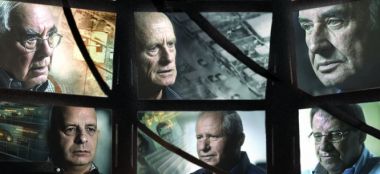Talking to Hamas terrorists is the only way forward for peace in Israel
Rachel Joyce, the author of The Unlikely Pilgrimage of Harold Fry, honed her craft as a writer of radio dramas. She said recently that the aim of that kind of writing was to grip its hearer so much that they would get into a nice warm bath and get out of a cold one 45 minutes later.

I did not watch The Gatekeepers last Saturday in the bath, but if I had I would surely have been suffering from hypothermia by the time it ended. It is a documentary first released in 2012, built around a mesmerising set of interviews with six former heads of the Shin Bet, the Israeli secret service. All now retired, they speak with a candour and clarity about their work that carries absolute conviction.
Let's be clear: these are not by any stretch of the imagination marshmallow liberals. They have done some pretty shocking things. They regret some of them, but not all: one of them, Carmi Gillon, almost purrs with satisfaction as he recounts the assassination of the terrorist Yahya Ayyash with an exploding mobile phone.
However: what makes the programme so powerful, and so shocking, is that they all reached the same conclusion: that the Shin Bet's tactics were generally successful, but that there was no political strategy for peace. There was no plan. No one wanted it badly enough. The result was, as the ageing hard man Avraham Shalom says: "We have become cruel, to ourselves as well, but mainly to the occupied population, using the excuse of the war on terror" – and there was no end in sight.
It's put best by Ami Ayalon in a section entitled 'The Old Man at the End of the Corridor', who described growing up on a kibbutz near the Sea of Galilee. "I had a wonderful childhood. I knew that there's a house in Jerusalem, and on the second floor there's a long corridor. At the end of the corridor there's a door, and behind the door is a wise man, who makes decisions."
Then: "Years later, after the Yom Kippur War [1973], I went to Jerusalem, and I went to that same building. I was on the second floor, and found no door at the end of the corridor, and behind the missing door, no one was thinking for me."
Parliament's vote in favour of recognising the Palestinian state, on the face of it, changes nothing. It won't make a scrap of difference to the policy of this government – though if Labour wins the next election it will be held to account. Even if the UK does break ranks with the US and join the swelling number of countries which recognise Palestine, that in itself won't change a thing in Gaza City or Ramallah. What it will do, though – and if this is all it does, it's still worth doing – is add one more voice, and not an insignificant voice, to the chorus of those who are saying to Israel, "Enough: you cannot, for your own sake as much as the Palestinians', continue like this any more."
Israel, quite rightly, will say that ending the conflict is not in its gift alone. Underplaying the wickedness of Hamas is in no one's interests. But more than most nations, the UK has a right to say certain things to Israel about ending conflicts with terrorists. We have done it; we have talked to people we hated, done deals with people we despised and found a grudging respect for them – and sometimes more.
In Jonathan Powell's book Talking to Terrorists: How to End Armed Conflicts, the chief broker of the Northern Ireland peace process says: "If you can't kill them all, then sooner or later you come back to the same point, and it is a question of when, not whether, you talk. If there is a political cause then there has to be a political solution."
The Shin Bet gatekeepers' plea was for a political solution before it was too late. Jonathan Powell says: "Dealing effectively with a terrorist threat requires political leadership, patience and a refusal to take no for an answer. What we need are more political leaders who are capable of remembering what happened last time – and prepared to take the necessary risks."
At the moment, there's no one at the end of the corridor. Where are the patient, wise leaders who have the courage not just for unending war, but for costly peace?











